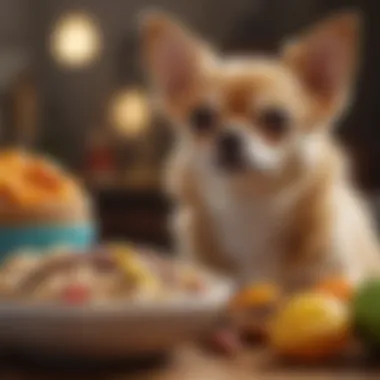Understanding the Unique Preferences of Chihuahuas


Intro
Chihuahuas are small dogs with a reputation for big personalities. Understanding their preferences becomes essential for owners and admirers alike. These pets have distinct likes and dislikes that can influence their behavior and overall well-being. Knowing what appeals to them can greatly improve the human-animal bond, ensuring that Chihuahuas thrive in their environments.
Animal Overview
Common Name and Scientific Classification
The Chihuahua, scientifically known as Canis lupus familiaris, is a toy breed named after the Mexican state of Chihuahua. It is one of the smallest dog breeds, recognized for both its size and spirited demeanor. Chihuahuas come in various colors, patterns, and coat lengths, adding to their charm.
Physical Characteristics
Chihuahuas typically weigh between two to six pounds and stand around six to nine inches tall. Their bodies are compact, with larger heads in proportion to their size. Their eyes are round and expressive, often reflecting their emotions clearly. The two main types of Chihuahuas are the smooth coat and the long coat, both with distinct grooming needs.
Habitat and Distribution
Originally bred in Mexico, Chihuahuas adapt well to various living situations. They thrive in apartments or small homes due to their size. Their preference for warm environments often leads them to seek cozy spots within the household. Chihuahuas are popular across the globe, found in urban centers and rural areas alike.
Behavior and Social Structure
Communication Methods
Chihuahuas communicate through barking, gestures, and body language. Their vocalizations can range from soft whines to vigorous barks, reflecting their mood. They also express themselves through tail position and wagging, which can indicate excitement or anxiety.
Social Hierarchies
Although small, Chihuahuas are assertive and may exhibit dominant behaviors. In homes with multiple pets, they often establish themselves as the assertive leader. Proper introductions and socialization are vital to prevent conflicts within a multi-pet household.
Mating and Reproductive Behavior
Chihuahuas reach maturity quickly, with females typically entering their first heat cycle between six to twelve months. Responsible breeding is essential, as their small size may lead to complications during pregnancy and delivery. Understanding their reproduction helps avoid health issues that may arise.
Conservation Status
Current Population Trends
Chihuahuas, as a breed, have gained immense popularity, especially in urban settings. This popularity has generated a stable population, though it's vital to be aware of breeding ethics to prevent overpopulation and health issues within the breed.
Threats and Challenges
While Chihuahuas are abundant, they face challenges such as irresponsible breeding practices and abandonment. These issues can lead to health problems that affect their quality of life.
Conservation Efforts and Success Stories
Various organizations focus on the welfare of Chihuahuas, promoting responsible ownership and ethical breeding. Success stories abound where shelters and breed-specific rescues work to find homes for abandoned Chihuahuas, emphasizing the importance of giving these unique dogs a second chance at life.
Intro to Chihuahuas
Chihuahuas are not just any small dog breed. Their unique characteristics and behavioral traits make them stand out in the canine world. Understanding these preferences is crucial for both current and prospective owners. This section aims to highlight the importance of grasping Chihuahuas' needs, offering insights into their history and physical traits.
History of the Breed
Chihuahuas trace their origins back to ancient civilizations in Mexico. They are believed to have evolved from the Techichi, a companion dog cherished by the Toltec civilization. This breed has been associated with cultural significance, often depicted in art and mythology. The modern Chihuahua gained increased popularity in the late 19th and early 20th centuries, especially in the United States, where they became symbols of wealth and celebrity.
Understanding the historical context of Chihuahuas provides valuable insights into their evolution from working dogs to beloved pets. This background allows owners to appreciate the deep-rooted connection between Chihuahuas and their human counterparts, contributing to their need for companionship and loyalty.
Physical Characteristics
The physical traits of Chihuahuas are diverse, yet they display key characteristics that define the breed. Typically, they weigh between 2 to 6 pounds and stand around 6 to 9 inches tall. Their small size is often coupled with a big personality. Chihuahuas have round heads, large expressive eyes, and ears that can either be erect or pendulous.
Distinct coat types are notable as well, ranging from short to long haired. Common colors include fawn, black, white, and a mix of these shades. Understanding their appearance helps owners provide appropriate grooming and care, enhancing both the health and comfort of the dog.
In summary, knowing the history and physical traits of Chihuahuas lays the groundwork for a deeper understanding of their social interaction, play preferences, and overall needs.


Fundamental Preferences of Chihuahuas
Understanding the fundamental preferences of Chihuahuas is critical in ensuring their wellbeing and fostering a harmonious environment. This section explores the essential aspects of social interaction and play preferences. Knowing these elements offers insights into how to strengthen the bond with Chihuahuas and enhance their quality of life.
Social Interaction
Bonding with Owners
Bonding with owners is a vital aspect of a Chihuahua's life. This bond cultivates trust and emotional security. Chihuahuas are particularly known for their loyalty and affection towards their owners, making it essential for owners to nurture this bond. The unique characteristic of Chihuahuas is their desire for companionship. They thrive on interaction and are more content when they feel close to their humans.
Additionally, strong bonds influence behavioral outcomes. A Chihuahua that feels secure will likely exhibit positive behaviors. This aspect of bonding also makes Chihuahuas responsive to training, as they want to please their owners. However, it is crucial to be aware that these small dogs may become overly attached, leading to separation anxiety if left alone for prolonged periods.
"Chihuahuas form deep connections with their owners, which is essential for their emotional health."
Interactions with Other Dogs
Interactions with other dogs are equally important for Chihuahuas. While they can be territorial, socializing them from an early age can lead to more well-adjusted adults. Engaging with other dogs allows Chihuahuas to practice communication skills and understand social cues. This is important for building confidence. The key characteristic here is that Chihuahuas benefit from controlled exposure to other dogs, especially of similar size.
On the negative side, some Chihuahuas may react aggressively to larger dogs due to their small size. Thus, owners must supervise interactions carefully. Finding well-matched playmates enhances not only social skills but also provides physical activity, which is crucial for their overall health.
Play Preferences
Favorite Toys
Favorite toys play an integral role in a Chihuahua's playtime and mental stimulation. These toys can be anything from plush animals to squeaky toys. The critical aspect of Chihuahuas' preferences for toys lies in their small size and texture. They often prefer soft toys that they can carry and chew on safely. These activities contribute to their emotional well-being and prevent boredom.
However, it is essential for owners to choose toys designed specifically for small breeds. Toys not intended for their size can pose choking hazards. The unique feature of toys in a Chihuahua's life is their role in developing problem-solving abilities. Engaging toys promote curiosity and can keep them entertained for extended periods.
Types of Play Activities
Types of play activities preferred by Chihuahuas vary widely. Regular walking and interactive games like fetch or hide-and-seek are both beneficial. Walking provides necessary exercise, while interactive games help in mental engagement. A key characteristic here is that Chihuahuas are dynamic dogs, needing a mix of physical and mental stimulation to keep them happy.
Owners must remember that Chihuahuas can become easily fatigued due to their small size. Overexerting them can lead to health issues. This is why moderation in play is vital. Moreover, engaging in play together strengthens the owner-pet bond and enriches the Chihuahua's experience of companionship.
Overall, understanding these fundamental preferences can guide owners in meeting the needs of their Chihuahuas effectively. The focus on social interaction and play preferences contributes to a better understanding of this unique breed, enhancing their overall happiness and health.
Dietary Likes
Understanding the dietary likes of Chihuahuas is essential for ensuring their health and happiness. This breed, known for its diverse personalities, also has specific preferences that influence their well-being. Choosing the right food enhances their energy, fur quality, and overall health.
Preferred Food Types
Dry vs.
Wet Food
When considering food choices for Chihuahuas, dry food and wet food present distinct advantages and disadvantages. Dry food, often in kibble form, is a popular choice due to its convenience. It tends to have a longer shelf life and can be less messy during feeding. This consistency aids in promoting dental health, as chewing kibble helps reduce plaque buildup. Furthermore, it can be easily portioned, helping owners maintain a proper diet for their pets.
On the other hand, wet food has its own merits, such as higher moisture content, which is beneficial for hydration. It typically has a stronger aroma and flavor, making it more appealing to finicky eaters. However, wet food usually requires refrigeration after opening, which can be a consideration for storage.
Notably, each Chihuahua may have a preference that aligns with their individual taste and texture experiences. Careful attention to their reactions during meal times can provide insights into which option they prefer.
Training Treats
Training treats serve a pivotal role in the training and behavior management of Chihuahuas. These small bites are effective as rewards during training sessions. Training treats are often designed to be more palatable, ensuring a Chihuahua remains engaged. Their size allows for quick consumption, meaning training can continue without much interruption. It also promotes positive reinforcement practices that are crucial in shaping good behavior.
Some key characteristics of training treats include their nutritional content, which should complement a dog’s regular diet. However, using treats can encourage overindulgence, so portion control is important. Owners should adjust regular meals to align with treat usage to maintain healthy weight.
Food Sensitivities
Food sensitivities in Chihuahuas can greatly impact their dietary preferences. This breed can exhibit reactions to certain ingredients, such as grains, dairy, or specific proteins. Symptoms may include digestive issues, skin irritations, or changes in behavior. Identifying food allergies is often challenging and may require careful observation and sometimes veterinary assistance.
Owners should consider an elimination diet, gradually introducing new food types to pinpoint sensitivities. Awareness of these needs ensures that Chihuahuas receive not only enjoyable meals but also nutritious ones that support their overall health.
Environmental Preferences


Understanding the environmental preferences of Chihuahuas is pivotal in ensuring their quality of life. This section addresses two main topics: Ideal Living Conditions and Safe Spaces. Each factor plays an important role in shaping a Chihuahua's well-being and contributes to their overall mental and emotional health. Tailoring their living environment according to their preferences leads to healthier and happier canine companions.
Ideal Living Conditions
Indoor vs.
Outdoor
Chihuahuas generally favor indoor living. This preference stems from their small size and sensitive nature. Indoor environments provide safety and comfort, minimizing exposure to potential threats. Unlike larger breeds, Chihuahuas may struggle with extreme weather conditions.
Some owners could consider allowing their Chihuahuas outdoor access. This can be beneficial for exercise but comes with certain risks like predators or harsh weather. Keeping them indoors is often seen as the more popular choice due to the sense of security it provides.
Key Benefits of Indoor Living:
- Protection from environmental threats
- Controlled temperature and environment
- Enhanced bonding opportunities with owners
Disadvantages of Indoor Living:
- Limited space for play
- Need for structured walks and activities
Comfort and Warmth
Chihuahuas require warm and comfortable environments. Due to their small body size, they are more prone to temperature fluctuations. A warm setting not only keeps them physically comfortable but also helps to alleviate anxiety and stress.
Providing cozy bedding, soft blankets, and warm clothing during colder times can significantly enhance their quality of life. Many owners often overlook this simple yet crucial need. A comfortable environment not only supports their physical health but also fosters emotional stability.
Benefits of Comfort and Warmth:
- Reduces stress levels
- Promotes better sleep and relaxation
- Supports overall health and immunity
Safe Spaces
Creating safe spaces for Chihuahuas is essential in their living environments. These spaces provide them with a retreat from stressors. Chihuahuas are sensitive to noise and unfamiliar situations. A designated safe space can help ease anxiety and provide comfort.
Potential safe spaces can include covered beds, quiet rooms, or areas with minimal foot traffic. This space should be free from distractions and potential hazards. Establishing a consistent, safe environment can make a significant difference in a Chihuahua's response to new experiences.
"A well-defined safe space is crucial for a Chihuahua's mental wellness, allowing them to recharge in times of need."
In summary, understanding and addressing the environmental preferences of Chihuahuas enhances their overall quality of life. The balance between indoor safety, warmth, and the need for an area free from anxiety-inducing elements is central to their happiness.
Exercise and Activity Needs
Exercise plays a critical role in the wellbeing of Chihuahuas. This small breed, known for its spirited nature, needs regular activity to maintain physical health and cognitive stimulation. Ensuring that Chihuahuas have an appropriate amount of exercise prevents obesity and promotes mental engagement. While they may not require extensive exercise compared to larger breeds, their specific needs must be met to keep them happy and healthy.
Daily Exercise Requirements
Chihuahuas benefit from at least 30 minutes of exercise each day. This can be broken into smaller segments, like two or three short walks, to accommodate their energy levels and attention spans. Regular exercise helps to reduce anxiety and behavioral issues, making it essential for those who seek a calm and well-adjusted pet. Moreover, creating a routine can drastically improve a Chihuahua's behavior and relationship with their owner.
Preferred Activities
Walking
Walking is arguably the most common form of exercise for Chihuahuas. They enjoy exploring their surroundings, which may help improve their social skills. The key characteristic of walking is its accessibility. It can be done almost anywhere and requires no special equipment.
- Benefits of Walking: This activity helps with weight management and provides essential socialization opportunities.
- Unique Features: Walking adapts easily to the dog's needs. Owners can choose routes that vary in length and difficulty.
- Disadvantages: Some Chihuahuas might be hesitant around larger dogs or busy environments; thus, supervision is essential during walks.
Agility Games
Agility games offer a fun alternative to standard exercise routines. These activities involve obstacles and challenges that stimulate a Chihuahua both mentally and physically. The key feature of agility games lies in their interactive nature, allowing dogs to bond closely with their owners.
- Benefits of Agility Games: They develop coordination and physical strength, reducing boredom and destructive behavior.
- Unique Features: Many forms of agility exercises can be set up at home, making it convenient for owners.
- Disadvantages: Not all Chihuahuas may understand the concept of agility, leading to frustration for the dog or owner if not introduced properly.
Regular exercise, be it walking or engaging in agility games, is a fundamental aspect of a Chihuahua's health. Dog owners must prioritize these activities to enhance their companionship with their furry friends.
Health and Well-being
Understanding the health and well-being of Chihuahuas is crucial for ensuring their quality of life. This small breed has specific needs that, when met, can lead to a longer and happier life. Focus on health allows owners to be proactive instead of reactive, addressing issues before they become serious problems. This section discusses common health issues and preferences in veterinary care, which are significant in their overall well-being.
Common Health Issues


Chihuahuas are prone to several health conditions due to their size and genetics. It's essential for owners to be aware of these issues to provide appropriate care. Some common health issues include:
- Dental Problems: Chihuahuas often face dental issues like periodontal disease and tooth loss. Regular dental care is vital.
- Patellar Luxation: This condition involves dislocation of the kneecap, leading to pain and difficulty in walking. Surgical intervention may be required in severe cases.
- Heart Disease: Chihuahuas can develop heart conditions, especially as they age. Regular check-ups can help catch problems early.
- Hydrocephalus: This is a condition where excess fluid builds up in the brain. Symptoms may include a swollen head or difficulty in coordination.
- Obesity: Given their small size, obesity can significantly impact their health, leading to diabetes and joint problems. Owners should monitor their dog's diet closely.
Being aware of these issues can aid in early detection and treatment. Regular veterinary visits should include checks for these conditions to promote a healthy lifestyle for Chihuahuas.
Veterinary Care Preferences
Chihuahuas often prefer specific approaches to veterinary care, shaped by their temperament and size. Understanding these preferences can foster a more comfortable experience for the dog. Key elements include:
- Gentle Handling: Due to their small size and sensitivity, gentle handling during examinations is essential. A calm approach can reduce stress significantly.
- Familiar Environment: Whenever possible, taking Chihuahuas to familiar places, such as a favorite park, can help them feel more at ease when visiting a vet.
- Routine Check-ups: Regular vet visits should not be overlooked. Establishing a routine can help the dog adapt to the process. Routine vaccinations and dental check-ups are critical for maintaining health.
- Quality of Care: Owners should seek veterinarians experienced with small breeds. This expertise can ensure that the care provided addresses the unique needs of Chihuahuas.
Here is a list of considerations for effective veterinary care:
- Choose a veterinarian who understands the breed.
- Prepare ahead of appointments to minimize stress for the dog.
- Track any changes in behavior or health to discuss with the vet.
- Ensure dental care is part of routine checks.
Taking proactive steps in health and well-being is a defining factor in the quality of life for Chihuahuas.
Understanding these health and veterinary preferences helps create a supportive atmosphere. This attention makes a significant difference in maximizing the Chihuahua's overall well-being.
Training and Behavior
Understanding the training and behavior of Chihuahuas is essential for successful companionship. This breed, while small, has strong personality traits that require thoughtful handling. Effective training not only ensures a well-behaved dog but also enhances the bond between the pet and owner. Recognizing behavioral patterns can help owners provide an environment that meets the Chihuahua's unique needs, fostering better welfare and happier living.
Effective Training Techniques
Training techniques for Chihuahuas need to be adapted to their specific characteristics. Here are some key methods that prove effective:
- Positive Reinforcement: Reward-based training is crucial. Chihuahuas respond well to treats, praise, and affection when they display desired behaviors. This approach encourages repeat actions.
- Consistent Commands: Use clear and simple commands. Repetition helps Chihuahuas learn what is expected. For example, commands like "sit," "stay," and "come" should be taught consistently.
- Short Sessions: Given their attention span, keep training sessions brief. This method maintains their focus and enthusiasm.
- Socialization Training: Allowing Chihuahuas to interact with varied environments, people, and dogs enhances their adaptability. Early socialization improves confidence and reduces anxiety.
- Avoid Harsh Methods: Negative reinforcement can lead to fear and aggression. Gentle handling is critical, as Chihuahuas are sensitive to their owner's tone and body language.
Socialization Preferences
Socialization is critical for Chihuahuas. This small breed has unique personality traits that require proper interactions with both people and other animals. A well-socialized Chihuahua can lead a happier and more balanced life. Understanding their preferences in socialization helps in crafting a suitable environment for their growth and comfort.
Interactions with People
Chihuahuas are known for their strong attachment to their owners. They often form deep bonds, which can be beneficial for both the pet and the owner. This breed generally enjoys time spent with people, but their interactions may vary based on individual temperament.
Many Chihuahuas are friendly and outgoing, always looking to meet new faces. However, some may display shyness or even caution towards strangers. To nurture positive interactions:
- Early Exposure: Introducing Chihuahuas to a variety of people from a young age can decrease anxiety and promote confidence. This exposure should be positive and gentle.
- Rewards during Interaction: Using treats or positive reinforcement while interacting with new individuals encourages friendly behavior.
- Recognizing Signs of Distress: It is vital to watch for signs of stress or fear, such as growling or hiding. This helps prevent negative experiences that can worsen their behavior.
Building a trusting friendship with their owner is also essential. Regularly engaging with your Chihuahua helps strengthen this bond, making them more open to social experiences.
Response to New Experiences
Chihuahuas can have mixed reactions to new experiences. While some might be curious and eager to explore, others may react negatively to sudden changes in their environment. Responding appropriately to their needs in these situations is important.
For better responses to new experiences:
- Gradual Introduction: When introducing a Chihuahua to new situations or environments, do it slowly. Begin with low-stress encounters and gradually increase complexity.
- Positive Reinforcement: Using treats or praise when they successfully adapt to a new situation can greatly help.
- Routine Maintenance: Keeping a consistent routine can give a sense of security. This allows them to feel safe when facing occasional changes.
A well-socialized Chihuahua is generally more adaptable to new experiences, which can significantly enhance their overall well-being.
With these considerations, ensuring healthy socialization patterns for Chihuahuas becomes more straightforward. Understanding their interactions with people and their responses to diverse experiences is key to raising a well-adjusted pet.
Ending
Recap of Chihuahua Preferences
Chihuahuas are not just small dogs; they have distinct personalities and preferences that are important to note.
- Social Interaction: They thrive on close bonds with their owners and may require socialization with other dogs to be well-adjusted.
- Play Preferences: Variety in toys and play activities influences their happiness. They enjoy interactive and stimulating toys.
- Dietary Likes: Understanding their preferred food types, whether dry or wet, ensures nutritional satisfaction. Training treats can also reinforce positive behavior.
- Environmental Preferences: They do better in warm, safe spaces, ideally indoors.
- Exercise Needs: Regular exercise is vital, including short walks and engaging activities like agility games.
- Health Care: Recognizing common health issues and providing consistent veterinary care helps maintain their health.
By wrapping these points together, we gain a comprehensive understanding of what makes Chihuahuas content.
Importance of Understanding Their Needs
Comprehending the unique needs and preferences of Chihuahuas leads to better care. Owners who understand their pets are more equipped to provide environments that stimulate both their physical and mental health.
- Enhanced Bonding: As owners align their routines with the dog's preferences, it fosters a stronger bond.
- Improved Behavioral Outcomes: By addressing their specific needs, problematic behaviors may diminish, providing a better home atmosphere.
- Tailored Care: Knowledge of health issues common to the breed can prompt timely veterinary consultations.







